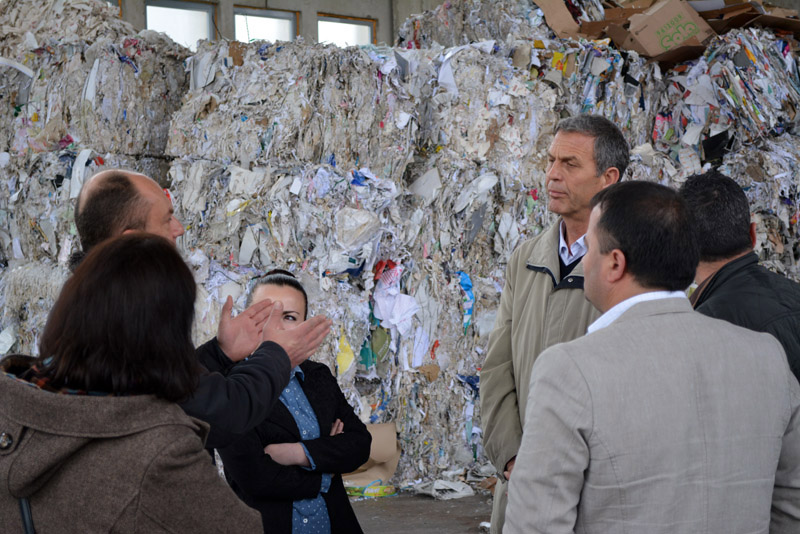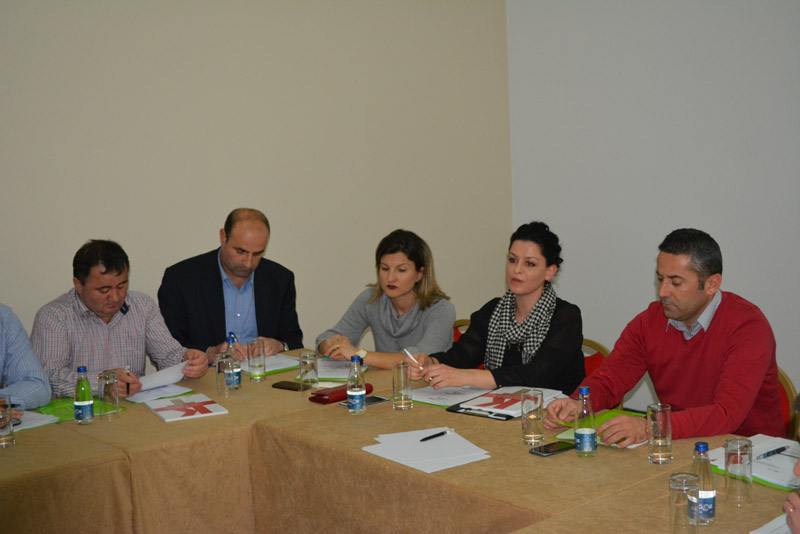 DLDP in cooperation with the Environment Ministry organized on March 26-27th a study visit in Kosova for the Centre of Competence for Waste Management. The trip aimed exploring and exchanging experiences between the two countries in one of the most priority sectors of public services. In this trip participated representatives of DLDP LGU partners, line ministries, and experts helping in the implementation of DLDP support packages for local units in relation with cost calculation as well as benchmarking technology. The group from Albania was headed by the Vice-Minister, MrsOlijanaIfti.
DLDP in cooperation with the Environment Ministry organized on March 26-27th a study visit in Kosova for the Centre of Competence for Waste Management. The trip aimed exploring and exchanging experiences between the two countries in one of the most priority sectors of public services. In this trip participated representatives of DLDP LGU partners, line ministries, and experts helping in the implementation of DLDP support packages for local units in relation with cost calculation as well as benchmarking technology. The group from Albania was headed by the Vice-Minister, MrsOlijanaIfti.
In the first day of the trip, a joint workshop was held with Kosovar partners of DEMOS and experts of Kosova Environment Ministry. The Project for Decentralization and Support of the Communes (DEMOS) helps communes to achieve tangible and visible improvements in offering services to citizens. The DEMOS project works in 17 partner communes, covering about 40% of Kosova population. This project, as is the case with DLDP, is financed by the Swiss Government and is implemented by HELVETAS Swiss Intercooperation, a Swiss-based international development organization which operates in 33 countries on 4 continents.
During the workshop sessions, DLDP experiences for cost calculation model and benchmarking methodology were presented, as well as DEMOS work in partner communes to set up the recycling service and the application of cost calculation in Peja commune. The workshop included also two presentations of the legal framework in Kosova on waste management and the impacts of legislation changes, as well as the experience of the Kosova Regulatory Office on Water and Waste (ZRRUM) in relation with the methodology of calculation and setting of tariffs in Kosova until 2012, when this competence was transferred to communes. The participants’ discussions were interesting toward the identification of issues in respective models which could potentially facilitate the practical implementation of pilot projects.
The second day of the study visit started with the meeting of local experts group in the regional company “Pastrimi” of Prishtina. The CEO of this company, MrFeim Salihu, presented the functioning and challenges facing this company that has a 50-year history and about 500 employees. The participants appreciated the experience gained by this company on billing and income collection, flexibility in the readiness of a park with more than 50 trucks, the innovative way of service monitoring and its inner organization. A brief visit in the company premises and billing and public relation offices were of much interest.
The other visit was carried out in Fushë-Kosova, at the recycling company R.S.I. Kosova. This Swiss-Kosovar joint-venture was actively trying to turn into an important actor. The relationships with local and foreign partners had enabled this business company, managed by ValdetAzemi, to be able to process each day a considerable quantity of paper and plastic materials. Being that both countries are in the first phases of extending the recycling business, the discussions were equally tangible and interesting. The quality of gathered materials, the way of payment and processing, customs obstacles and variable prices were issues discussed in length. The Vice-Minister Ifti, responding to the concerns of MrAzemi about the impossibility of exporting recycled materials from Kosova, due to the lack of signing of Basel Convention, explained the discussion that took place with her Kosovar partner to find possibilities of supporting business by making the necessary legal amendments. In his discussion, MrAzemi focused in experiences related to Prishtina on recycling, especially in Dardania quarter, as well as in the difficulties being faced by non-recycling families. His company gathered mainly recycled material from businesses, especially from the many grocery stores on the Kosovar capital.
The visit then continued in the company hangars, where the participants learned about the separation of different types of plastics depending on quality and price, their recycling procedure, packaging and preparations for sale.

The Centre of Competence for Waste Management visit to Prishtina
In the first day of the trip, a joint workshop was held with Kosovar partners of DEMOS and experts of Kosova Environment Ministry. The Project for Decentralization and Support of the Communes (DEMOS) helps communes to achieve tangible and visible improvements in offering services to citizens. The DEMOS project works in 17 partner communes, covering about 40% of Kosova population. This project, as is the case with DLDP, is financed by the Swiss Government and is implemented by HELVETAS Swiss Intercooperation, a Swiss-based international development organization which operates in 33 countries on 4 continents.
During the workshop sessions, DLDP experiences for cost calculation model and benchmarking methodology were presented, as well as DEMOS work in partner communes to set up the recycling service and the application of cost calculation in Peja commune. The workshop included also two presentations of the legal framework in Kosova on waste management and the impacts of legislation changes, as well as the experience of the Kosova Regulatory Office on Water and Waste (ZRRUM) in relation with the methodology of calculation and setting of tariffs in Kosova until 2012, when this competence was transferred to communes. The participants’ discussions were interesting toward the identification of issues in respective models which could potentially facilitate the practical implementation of pilot projects.
The second day of the study visit started with the meeting of local experts group in the regional company “Pastrimi” of Prishtina. The CEO of this company, MrFeim Salihu, presented the functioning and challenges facing this company that has a 50-year history and about 500 employees. The participants appreciated the experience gained by this company on billing and income collection, flexibility in the readiness of a park with more than 50 trucks, the innovative way of service monitoring and its inner organization. A brief visit in the company premises and billing and public relation offices were of much interest.
The other visit was carried out in Fushë-Kosova, at the recycling company R.S.I. Kosova. This Swiss-Kosovar joint-venture was actively trying to turn into an important actor. The relationships with local and foreign partners had enabled this business company, managed by ValdetAzemi, to be able to process each day a considerable quantity of paper and plastic materials. Being that both countries are in the first phases of extending the recycling business, the discussions were equally tangible and interesting. The quality of gathered materials, the way of payment and processing, customs obstacles and variable prices were issues discussed in length. The Vice-Minister Ifti, responding to the concerns of MrAzemi about the impossibility of exporting recycled materials from Kosova, due to the lack of signing of Basel Convention, explained the discussion that took place with her Kosovar partner to find possibilities of supporting business by making the necessary legal amendments. In his discussion, MrAzemi focused in experiences related to Prishtina on recycling, especially in Dardania quarter, as well as in the difficulties being faced by non-recycling families. His company gathered mainly recycled material from businesses, especially from the many grocery stores on the Kosovar capital.
The visit then continued in the company hangars, where the participants learned about the separation of different types of plastics depending on quality and price, their recycling procedure, packaging and preparations for sale.
Related posts
New functions and monitoring of performance indicators for LGUs
Read more
Funksionet e reja dhe monitorimi i treguesve të performancës tek NJQV
Read more
National Competition of Best Local Practices 2016
Read more